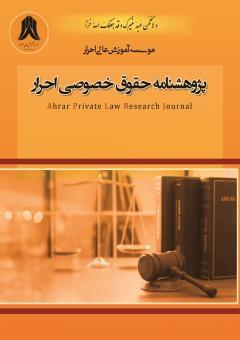بررسی حقوقی سکونت زوجه در منزل مشترک در ایام عده رجعیه
محورهای موضوعی : حقوق خانوادهفاطمه فلاح پور 1 * , سید محمد اسدی نژاد 2
1 - کارشناس ارشد حقوق خصوصی، گروه حقوق، مؤسسه آموزش عالی احرار، رشت، ایران.
2 - دانشیارحقوق خصوصی، گروه حقوق، دانشکده ادبیات و علوم انسانی، دانشگاه گیلان، رشت، ایران.
کلید واژه: زوجه, طلاق رجعیه, مسکن, عده رجعی, منزل مشترک,
چکیده مقاله :
مسکن زوجه یکی از اساسی ترین مصداق های نفقه و همچنین یکی از ارزشمندترین حقوق مالی زوج به حساب می آید که جایگاه بسیار حساس در استحکام و پایداری خانواده ایجاد می نماید. ازاینرو؛ بر اساس ماده 1005 ق.م زوجین میتوانند در ایام نکاح راجع به محل سکونت خود توافق کنند. بدین ترتیب توافقی که زوجین جهت سکونت زوجه در منزل مستقل می نمایند؛ براساس ماده فوق الذکر امکان پذیر است. همچنین در زمانی که نکاح منحل گردیده در مواردی خاص همانند ایامی که زوجه در عده طلاق رجعی به سر می برد قانون گذار زوجین را ملزم کرده است تا برای مدتی مشخص و معلوم به سکونت خود در منزل مشترک کنار یکدیگر ادامه داده بخاطر اینکه مطلقه رجعیه در ایام عده طلاق رجعی همانند زوجه می باشد و حقوق و تکالیفی که برای او بار می شود همانند زوجه در ایام نکاح می باشد. همچنین در خصوص ماهیت سکونت زوجین در منزل مشترک، گرچه سکونت مشترک به تناسب اطلاق عقد می باشد که توافق و رضایت برخلاف آن نیز ممکن می باشد. امّا این سکونت در منزل مشترک به نوعی حق شوهر نیز محسوب می گردد و یکی از لوازم حُسن معاشرت می باشد و اسقاط آن به تنهایی ممکن نبوده و باید با تراضی زوج باشد. از اینرو پژوهش حاضر بهصورت تحلیلی – توصیفی به بررسی حقوقی سکونت زوجه در منزل مشترک ایام عده رجعیه پرداخته و نتایج حاصل از این پژوهش حاکی از این امر میباشد که مطلقه رجعیه در ایام عده همچنان حق تعیین نمودن مسکن را داشته ولی این حق با تکالیفی که راجع به سکونت در خانه مشترک می باشد قابل جمع بوده و زوجه حق ندارد از قبول نمودن همسر(شوهر) خویش در خانه مشترک استنکاف نماید.
Wife's housing is considered one of the most basic examples of alimony and also one of the most valuable financial rights of the couple, which creates a very sensitive position in the strength and stability of the family. therefore; According to Article 1005 of the Civil Code, couples can agree on their place of residence during the marriage. In this way, the agreement that the couple makes for the wife to live in an independent house; Based on the aforementioned article, it is possible. Also, when the marriage is dissolved In special cases, such as the days when the wife is in the category of retroactive divorce, The legislator has required couples to They have continued to live in a common house next to each other for a certain period of time, Because a divorcee during the period of divorce is the same as a wife, And his rights and duties are the same as those of a wife during marriage. Also, regarding the nature of the couple's residence in the joint house, Although cohabitation is proportional to the meaning of the contract, that agreement and consent against it is also possible. But this residence in the joint house is also considered as the husband's right And it is one of the accessories of good company, And it is one of the accessories of good company, Therefore, the present research has analyzed the legal analysis of the wife's residence in the common house during the days of the Rejiya. And the results of this research indicate this, But this right is shared with the duties related to living in the house, It can be collected and the wife has no right to complain about accepting her husband in the joint house.
The Holy Quran.
Emami, Seyyed Hassan, (2008), "Civil Rights", Volume 4, Tehran, Islamia bookstore.
Emami, Seyyed Hasan, (2011), "Civil Laws", Volume 1, Tehran, Islamia bookstore.
Azar Noush, Azartan, (2011), "Contemporary Persian-Arabic Culture", Tehran, Ni Publishing.
Khodadadpour, Manijeh, (2014), "Civil responsibility in couple relationships, a comparative study in
some European and Islamic countries", Qom, Tebian Cultural and Information Institute.
Dayani, Abdur Rasool, (2007), "Family Laws", Tehran, Mizan Publications.
Safai, Seyyed Hossein and Emami, Asadullah (2009), "Summary of family law", Tehran, Mizan
publishing house.
Taheri, Habibullah, (2012), "Civil Laws", Volume 3, Qom, Islamic Publications Office affiliated with
the Qom Seminary Teachers Society.
Katouzian, Nasser, (2004), "General rules of contracts", Tehran, publishing company.
Katouzian, Nasser, (2020), "Civil Law in the Current Legal System", 62nd Edition, Mizan Legal
Foundation Publications.
Mohagheq Damad, Seyyed Mostafa, "Family Laws", (1989), Tehran, third edition.
Moin, Mohammad (2017), "Persian Culture", Tehran, Sokhon Amirkabir publishing house.
Motahari, Morteza (2016), "Women's Rights System in Islam", Tehran, Sadra Publications.
Marwarid, Ali Asghar (1981), "Yanabi' al-Faqih", Qom, Dar al-Kitab al-Islami.
Jokar, Mahbubeh (2018), "Ethical, jurisprudential and legal rights and mutual duties of husband and
wife", quarterly magazine in the field of women and family studies, Tahura, fourth year, number
8, pages 79-116.
Melai Kashi, Betoul (2017), "Jurisprudential and Legal Review of Wife Housing", Master's Thesis,
Private Law, Islamic Azad University of Mazandaran, Faculty of Theology and Islamic Studies.

